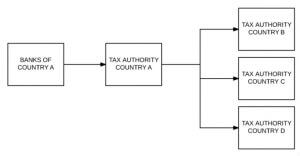Automatic Exchange of Information and Tax Residency
How the Exchange of Tax Information works and how to set the proper Tax Residency
For some time now, various countries of the world have been sharing information via tax treaties. These tax treaties are typically a dual tax convention (DTC) or a tax information exchange agreement (TIEA)
- DTC = two countries agree on a variety of factors which impact the tax of a person living or doing business somehow in both jurisdictions. Usually broad-ranging and impact different types of tax such as income, capital gains, residency
- TIEA = two countries agree just to share information – but no specific treaty for the relief of double taxation is provided.
However in the past, these treaties were slow to actually enforce upon a person, and oftentimes took months or even years to trade information about a person. A tax authority in one country A would have a question for another country B about taxpayer X, and then that country B would have to investigate somehow (or permit country A to investigate, which is oftentimes impractical) and country B would ask Beta Bank about customer X’s accounts. It was a slow and tedious process.
FACTA
Then along came FACTA. The idea that all banks (or more precisely foreign financial institutions) should report ALL their accounts to the US – specifying whether a person is, or is not – a US person. This is done through forms W8 and W9m respectively. The penalties for noncompliance of FACTA for an FFI is 30% withholding on any payments sent through the US. As most of the global banking in 2017 still happens through US dollar correspondent banking – this is a piece of legislation with teeth.
OECD’s Automatic Exchange of Information (AEOI)
As a response, the world created their own information sharing agreement – called AEOI – which uses the common reporting standard (CRS – which is basically an XML format to report on accounts) – to request information about account holders. The difference between. AEOI and previous attempts at tax information reporting harmonization are that AEOI has massive adoption rates. If you look – almost every country in the world (with several notable exceptions) has signed up for AEOI.
You can check our free tools incorporations.io and bankaccounts.io to know which countries are committed to implementing the AEOI:


How does the Automatic Exchange of Information work?
What does this mean to me? It means that if you have bank accounts, or you are a resident, or you have a company, or you are an employee or otherwise known to the taxman in a country who has signed up for the Automatic Exchange of Information (AEOI), they can and will share that information with any other country who has also signed up for AEOI.
The importance of Tax Residency
It means that tax residency – was – is – and will be – very important! As far as flag theory goes – the rules are exactly the same. Firstly – you need a passport or citizenship that does not tax you on a global basis. You can see Passports.IO for a full list of citizenship options.
Secondly – your tax residency and the second flag, is exceptionally important. It is not a prudent idea to “hide in the shadows” or think that you may “fall through the cracks” or otherwise avoid being noticed. All banks and all countries reporting – you can assume that your information can and will be shared with other governments without your knowledge or consent.
So after you have tax residency in a place without CFC laws – you can operate an offshore entity, with banking in a premier jurisdiction. As long as you have your personal tax residency (as well as the ‘residency’ or domicile of the corporation properly established – then you are good to go).

What this means is several things:
- Setting up in a country WITHOUT AEOI is an option if you want to
- Residency is, was, and always will be key in a more transparent world
- Governments and banks are sharing information about you
How we can help you
As we have seen, now more than ever, setting the tax residence in the proper jurisdiction is a primordial step to structure and optimize your business, where a bad approach can dramatically affect your tax liability, or even lead to legal issues. Read more about tax residency and know if your corporation is really tax-free.
To be up to date about the exchange of tax information agreements and related issues, consider joining our FT Intel Society and our Newsletter, where we periodically share updates about it.
If you are looking for a jurisdiction to immigrate and set your tax residency, it may be helpful our free tool: passports.io, where you can compare citizenship and immigration programs and residency options.
To compare jurisdictions to incorporate a company, you can use incorporations.io, where you can browse by tax rates, tax treaties, CFC laws, and AEOI commitments, among other features. If by now, you are only looking for an offshore bank account, you may check bankaccounts.io, our banking comparison free tool, where you can compare banks where our introduction can lead you to open an offshore bank account.
If you need personalized advice to find an integral internationalization solution tailored to your personal and business particular circumstances, needs and priorities, check our consulting services or reach out us at [email protected].


